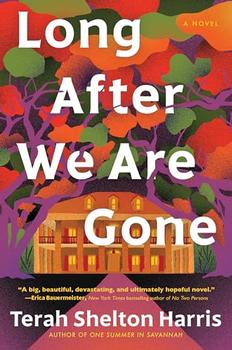Summary | Excerpt | Reading Guide | Discuss | Reviews | Beyond the Book | Read-Alikes | Genres & Themes | Author Bio

A Novel
by Terah Shelton HarrisThis article relates to Long After We Are Gone
 In Terah Shelton Harris's novel Long After We Are Gone, the family at the heart of the story is at risk of losing their land because it's considered "heir property" (aka "heir's property" and "heirs' property"). The author defines this as "a form of ownership in which descendants inherit an interest in the land, similar to holding stock in a company. Heir property does not constitute a clear title which means the land is vulnerable to developers, corporations, and governments to use 'legal' laws to acquire the land." Because of the vagaries of ownership associated with heir property, it's often been used to deprive Black farmers of their inherited land — just one of many such tools that have been systematically employed to dispossess them of their property over the decades since emancipation.
In Terah Shelton Harris's novel Long After We Are Gone, the family at the heart of the story is at risk of losing their land because it's considered "heir property" (aka "heir's property" and "heirs' property"). The author defines this as "a form of ownership in which descendants inherit an interest in the land, similar to holding stock in a company. Heir property does not constitute a clear title which means the land is vulnerable to developers, corporations, and governments to use 'legal' laws to acquire the land." Because of the vagaries of ownership associated with heir property, it's often been used to deprive Black farmers of their inherited land — just one of many such tools that have been systematically employed to dispossess them of their property over the decades since emancipation.
Black farmers have historically faced massive hurdles to land ownership in the United States. Before the American Civil War, not very many were able to establish their own farms, in some cases being prohibited by law. There was a glimmer of hope that this would change after the defeat of the Confederacy; civil rights laws were passed which in theory granted Black men equal rights to white ones. In addition, a few reparation programs were put in place, including Special Field Order No. 15, which divvied up Confederate plantations and deeded them to formerly enslaved Black families. However, Abraham Lincoln's successor, Andrew Johnson, ordered the lands returned to their original (white) owners, so most Black farmers were divested of the land they'd been given, and many states enacted laws restricting their rights.
Some Black landowners were able to hold on to their property, but financial stability remained elusive. Most farmers, then as now, took out loans to buy seed and fertilizer for the coming year, which they'd pay back once harvested crops were sold. White farmers could obtain these loans from the federal government, which denied them to their Black counterparts. Black farmers were forced to turn to their wealthier white neighbors for funds, who frequently charged exorbitant rates, often leading to loss of land (which they'd then continue to work as sharecroppers, a system only marginally better than slavery). Nevertheless, in 1910 it's estimated that some 200,000 Black farmers owned around 20 million acres of land, primarily in the South.
It's long been acknowledged that federal practices, particularly those of the U.S. Department of Agriculture, have been responsible for Black land loss since its peak in the early 20th century. USDA policies were deemed so discriminatory that at one time the agency was widely known as "the last plantation." Over the past century, these practices, including laws that make it harder to retain heir property, have resulted in the systematic seizure of millions of acres of farmland and have, according to the National Black Food and Justice Alliance, "robbed Black farmers and their families of hundreds of billions of dollars of inter-generational wealth."
Recent years have seen movements to correct some of these wrongs. In 2020, U.S. Senators Cory Booker (D-NJ), Elizabeth Warren (D-MA), and Kirstin Gillibrand (D-NY) introduced the Justice for Black Farmers Act, which would "enact policies to end discrimination within the USDA, protect remaining Black farmers from losing their land, provide land grants to encourage a new generation of Black farmers and restore the land base that has been lost, and implement systemic reforms to help family farmers across the United States." Among other things, the act would:
It has been pointed out that such land grants were awarded early in the country's history (e.g., the 1862 Homestead Act), but most were unavailable to Black citizens. The proposed 2020 act died in committee. It was reintroduced in 2021 and again in 2023 but has yet to pass as of this writing.
Black farmers protest USDA discrimination at Lafayette Park across from the White House in 1997, from U.S. Department of Agriculture
Filed under Places, Cultures & Identities
![]() This article relates to Long After We Are Gone.
It first ran in the June 5, 2024
issue of BookBrowse Recommends.
This article relates to Long After We Are Gone.
It first ran in the June 5, 2024
issue of BookBrowse Recommends.
These are not books, lumps of lifeless paper, but minds alive on the shelves
Click Here to find out who said this, as well as discovering other famous literary quotes!
Your guide toexceptional books
BookBrowse seeks out and recommends the best in contemporary fiction and nonfiction—books that not only engage and entertain but also deepen our understanding of ourselves and the world around us.